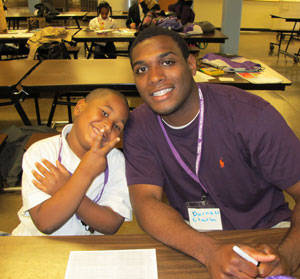For the second year running, the University of St. Thomas was named to the President’s Higher Education Community Service Honor Roll by the Corporation for National and Community Service.
During the 2009-2010 academic year, St. Thomas programs and departments reported that an estimated 6,147 students contributed 443,858 hours of community service.
“Congratulations to St. Thomas and its students for their dedication to service and commitment to improving its community,” said Patrick Corvington, chief executive officer of the Corporation for National and Community Service. “We salute all the honor roll awardees for embracing their civic mission and providing opportunities for their students to tackle tough national challenges through service.”
St. Thomas was one of 16 Minnesota colleges and universities named to the honor roll. Three others received additional recognition: the College of St. Benedict and Metropolitan University were named to the honor roll with distinction, and Augsburg College was one of six institutions nationally named to the presidential honor roll.

St. Thomas student volunteer Darnell Clark with his "reading buddy."
Honorees are chosen based on a series of selection factors, including the scope and innovation of service projects, the extent to which service-learning is embedded in the curriculum, the school’s commitment to long-term campus-community partnerships, and measurable community outcomes as a result of the service.
“Community involvement and service have long been important aspects of a St. Thomas education,” commented Meghan Allen Eliason, director of the university’s Center for Intercultural Learning and Community Engagement (CILCE).
“Involvement in and awareness of our community, along with a commitment to the principles of Catholic social teaching, are central to the purpose of our university and our community service-related offices.”
In its honor roll application, St. Thomas described the breadth of community involvement across the university. Some examples:
- The university offers more than 50 sections of academic service-learning courses each year.
- The College of Applied and Professional Studies, the School of Social Work, and Justice and Peace Studies all have internship, fieldwork or clinical requirements through which students serve those in need.
- Hundreds of St. Thomas students work with youth at local schools each semester through the Tutor-Mentor Program.
- VIA (Volunteers In Action) sends student volunteers to a variety of service sites in the local community throughout the academic year.
- St. Thomas’ largest undergraduate major, business, has the Business 200 service-learning requirement for graduation.
- All law students must complete required public-service hours before graduating.
- All seminarians must serve in the community.
- All student clubs and organizations must fulfill a service requirement each semester.
- Student-faculty summer research grants are designated each year for community-based research projects.
- The university supports several structured, community-service, work-study programs through which low-income St. Thomas students work with local young people.
- VISION (Volunteers In Service Internationally Or Nationally), allows students to lead and participate in life-changing, service-immersion trips.
In addition to these ongoing programs and requirements, specific St. Thomas initiatives highlighted were the Students Today Leaders Forever: Pay It Forward tour; the Literacy Connections Program, through which students can earn AmeriCorps education awards as part of the M3C program; Early College Awareness Outreach;
HIV/AIDS Service-Learning initiative; a recent service-learning course that paired English 111 students with youth and families from the College Prep Elementary School in St. Paul; and the Interprofessional Center for Counseling and Legal Services, where graduate-level law, psychology and social work students collaborate to provide pro-bono services to clients, with a focus on the elderly, immigrants and community-justice cases.
“CILCE thanks and congratulates all those who contributed information to the honor roll application and who support campus-community engagement efforts that allow our university to live out its mission,” Allen Eliason said.






